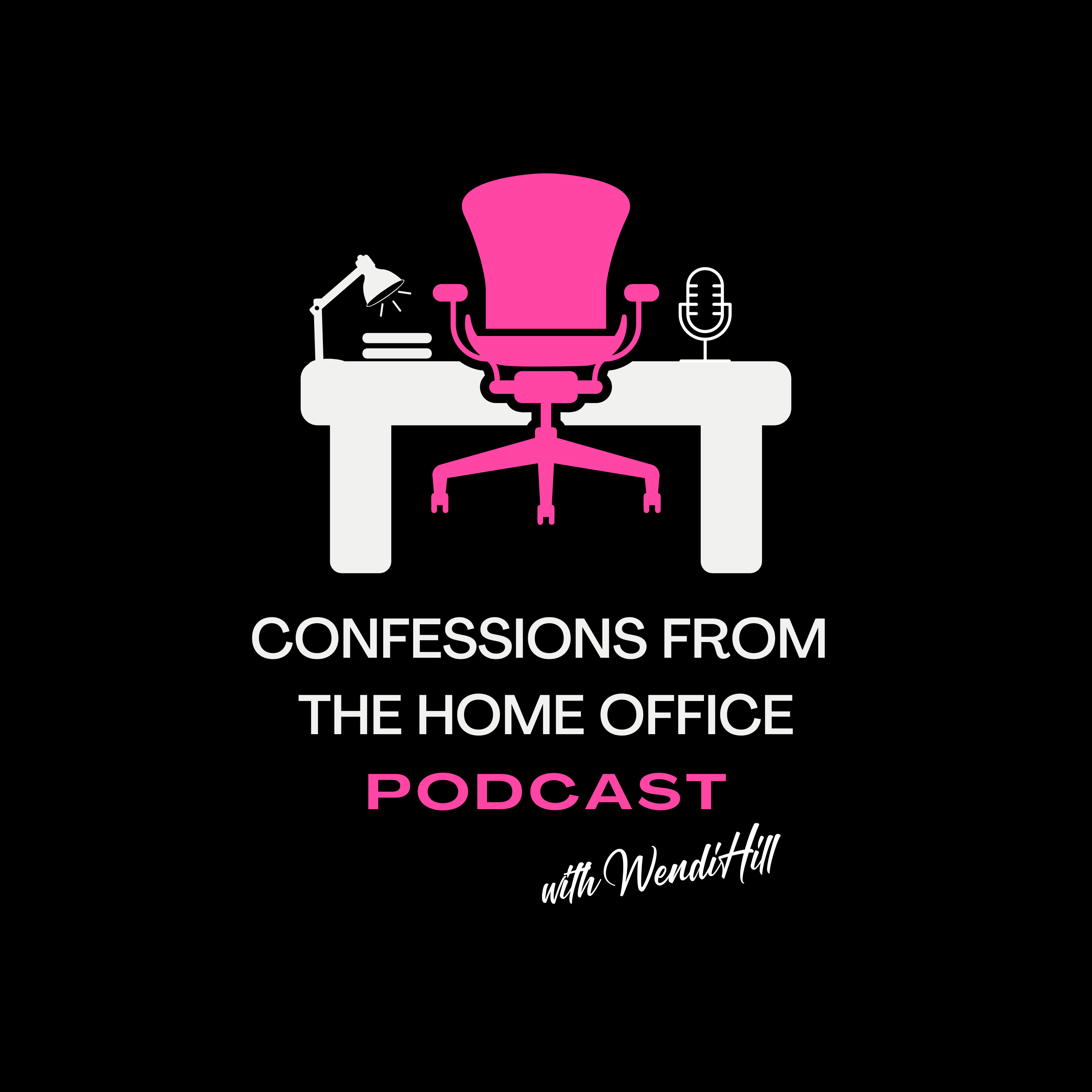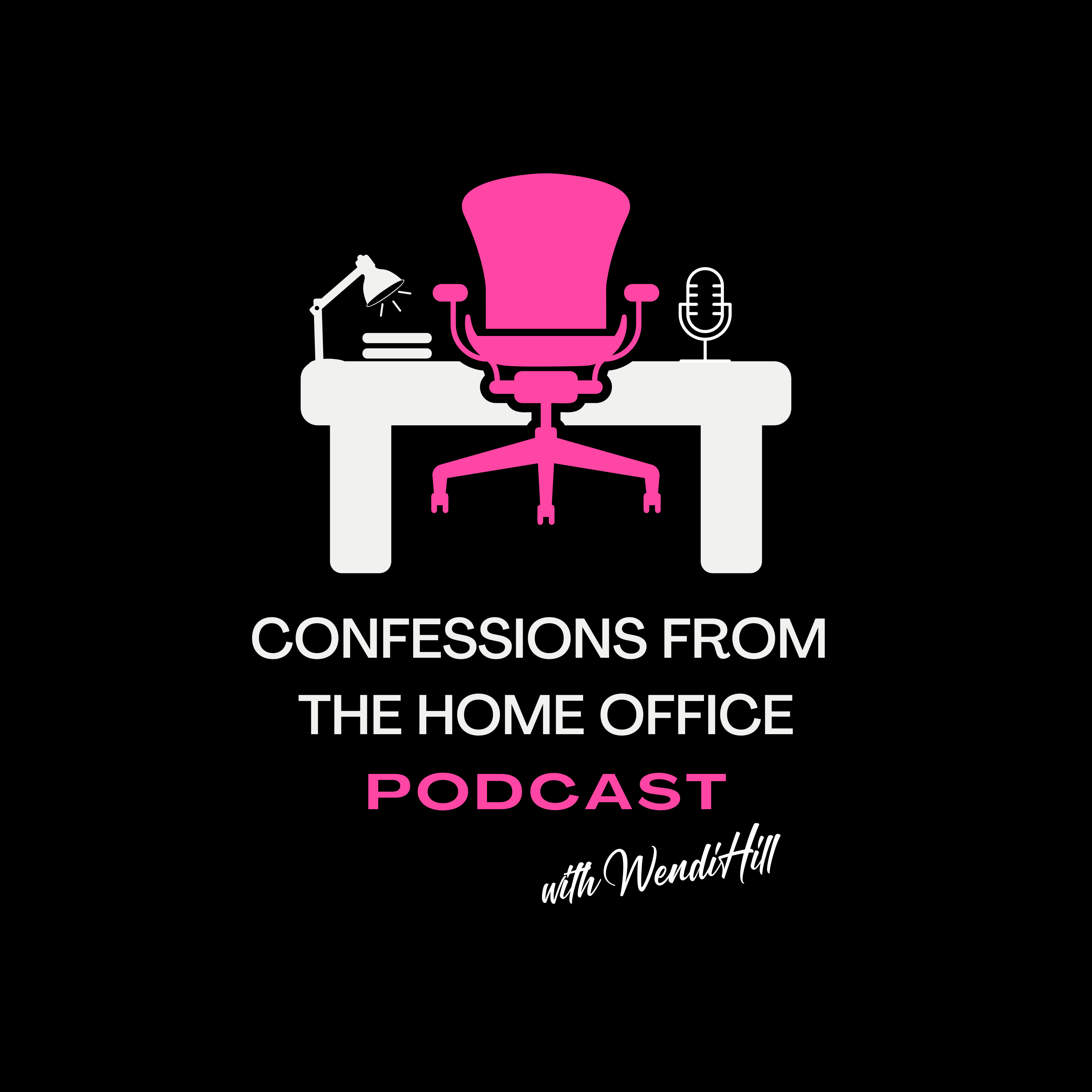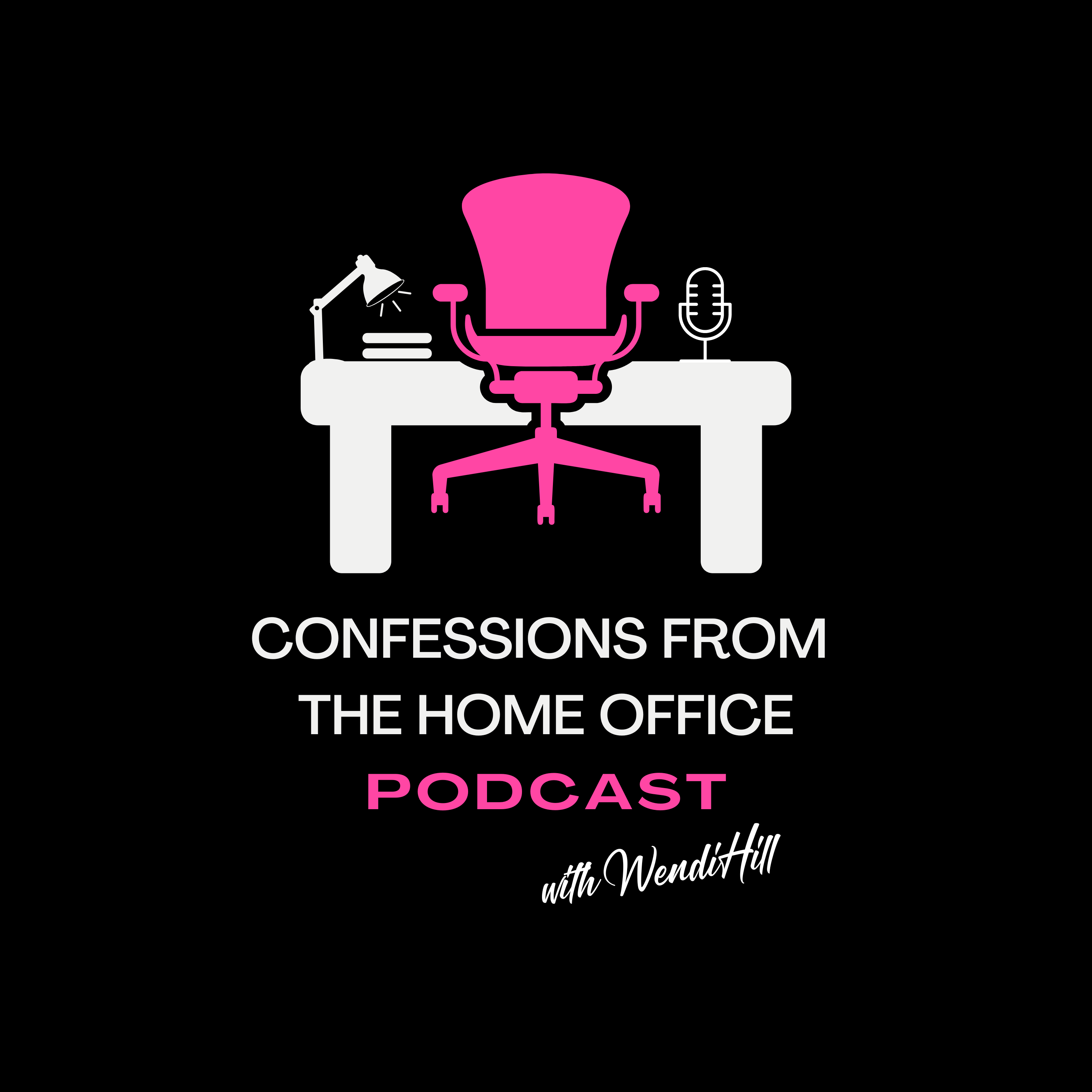Episode Transcript
[00:00:06] Hi, everyone. Welcome back to the Confessions from the Home Office podcast. I'm Wendy Hill, and today I want to talk to you about one of the biggest mindset shifts I've had to make as a business owner, and it's something that I'm still working on.
[00:00:20] I want to talk to you about why you need to start running your business based on emotion and start paying attention to your data. So let's just say for this episode, we want to talk about data over drama.
[00:00:31] So this episode is for you. If you've ever said it just doesn't feel like this is working, no one's buying. I don't have any leads coming in. And why am I even doing this? The truth is, you might be right, but you might also be completely wrong and your feelings are tricking you. I call that head trash. And it's time to take that trash to the curb.
[00:00:53] So here's the problem with emotion led decisions. Your feelings are real.
[00:00:58] I'm not dismissing your feelings, but they're not really that reliable.
[00:01:02] So running a business is emotional. Of course it is. You've put your heart and soul into it. It may be your only source of income you're creating, risking putting your name on everything you do, but the danger is when you make decisions from those emotions instead of about them.
[00:01:18] So here's what that can look like. You ghost your audience after a post flops, or if someone makes makes a negative comment and you just kind of shrink back and don't do anything for a few days or a few weeks. Or you drop your prices because you wouldn't pay that much even though others would. Or you get worried of no one's going to buy, so I need to mark this down just so I have something coming in.
[00:01:38] Or you abandon an offer after a slow week instead of checking your actual trends or figuring out that maybe it's a holiday week and no one was really paying attention and you need to keep promoting it.
[00:01:49] That's like flying a plane through fog without any instruments. You're just kind of. You have this feeling of things aren't working, things aren't good.
[00:01:57] The sky is falling and that can lead to burnout, confusion, and just, I don't know, sometimes it can lead to depression for business owners. So here are the core metrics every business owner should track.
[00:02:11] Now, this isn't some big data dashboard, so don't send me a message and say you missed a bunch of things. These are things that we can talk about on a podcast and can be easy for people to understand and for them to locate.
[00:02:23] So you don't need a degree in marketing, analytics or a huge 40 page report. I just want you to start with looking at these numbers. I want you to look at your website visits, your traffic, what are people doing? I want you to look at your social, social reach and impressions. If you're posting, if you're not, things are probably going to be pretty low, pretty dead. And if you are posting, what are some top performing posts? Or if you're sending out email blast or which ones are your top performing ones? And those are things that you should focus on and try to recreate. Not exactly, but maybe the strategy behind it or certain language you used.
[00:03:01] Now let's so look at engagement. I want you to look at click through rates. I want you to look at comments, shares and saves.
[00:03:09] And here's a big one. Do you get replies back on Your emails or DMs or this is something big that happens with me. Are people contacting you and saying, I'm seeing what you're doing or I saw these posts and I referred this person to you. Or better yet, you can get copied on an email where someone's referred you to somebody that they know.
[00:03:30] And then I want you to look at sales and revenue and returns. How's your monthly revenue doing? If the sky is falling but your revenue is steady or growing, is it really falling?
[00:03:41] How are your conversion rates? How many leads are turning into customers?
[00:03:45] What's the lifetime value of a client or what's their average spend? Is that doing okay?
[00:03:50] And I want you to look at your ROI on your ad spend or your collaborations.
[00:03:56] Now, if there's things that are just tanking and tanking over time and even after adjustments, yes, that's something that you need to yank, change, whatever. But if you track nothing else, I want you to start with these because once you know what's happening, you can do something about it. Otherwise you're just stressing out, filling your head full of head trash, thinking everything is crashing and burning when I have the feeling that it's probably not.
[00:04:21] So let's talk about real life data versus drama moments. I want to share two examples with you from clients that kind of will bring this home. So the first one is, you know, a client said, my Instagram's dead. No one's paying attention to her Instagram. She was ready to give up. But you know when you go in and you pull the insights back in the back end of Instagram, the stats were starting to show us really was going on. Her reach was up over the past 30 days, it was around 45% of an increase. What was a real issue, she had not created a call to action with her post. So people were looking, but they really didn't know what to do after that. So that was easy to fix. And remember, most of us are our own worst critics. We think things are worse than they really are. And I think it's hard when you put things out on Instagram.
[00:05:13] You've created the post, you've created the graphics, you've created the content. So you've put it all out there. And if you don't start liking it and commenting on it right away, you feel like it's failed and it's flopped. No, that's really not the case. People are just bombarded all day long with things and think about your. When you're scrolling, how many new things are popping up.
[00:05:35] So it's really good to look at the stats, look at the insights.
[00:05:39] And then the second example is a client said, you know, they launched a rebate program. And then they said, well, no, no one's. No one's done anything about it. I've had a couple of calls, but no one's done anything about it. Well, the rebate offer is a huge undertaking. It's a huge project for the customer.
[00:05:55] But they did get a couple of sales after a few months.
[00:05:58] And when they looked at the numbers, they had only promoted it twice.
[00:06:03] And that email list only had 200 people on it.
[00:06:07] So that was a 2% conversion rate. That's really not that bad.
[00:06:10] The issue wasn't the offer, it was the marketing Runway.
[00:06:15] You need to send more than just two emails about something.
[00:06:20] So like I was saying a minute ago, everyone is bombarded. It takes multiple exposures. Maybe it's not just emails. Maybe it's things through social media. Maybe it's an article on LinkedIn. Maybe it's a testimonial from the first customer who actually went through with the rebate program. So I hate to break it to you, but people are not waiting to see what you do next. Most of the time, you have to interrupt them.
[00:06:46] So the lesson with all this is feelings often don't match reality. And without data, you can't make confident decisions.
[00:06:55] So here's how to build a data first mindset.
[00:07:00] First, I want you to ask yourself, where's the proof? Before you panic over something or you decide to completely change your business, I want you to look at the data. Is it really not working? Are you just tired, hungry, or emotional? And I get it. I Can be all three and think I just want to shut the computer and be done from time to time because there's usually other things going on too, or it's just been a Monday on a Tuesday.
[00:07:26] I want you to track weekly but only really review monthly. So if you can take a few minutes once a week. I know I talked a couple episodes episodes ago about blocking off maybe twice a week to work on your personal branding. Maybe you tack this on to the end of it, pulling your stats and reviewing your metrics. And then once a month after you close out your month or you know, after everything's in, sit down and really look at things and do it when you've had some sleep, maybe a little caffeine and you're not completely distracted.
[00:07:55] And I want you to detach personally from all this. Your data isn't judging you, it's just the numbers. It's telling you what's working, what's not. Just learn from it. It's just kind of like looking at your checkbook, you know, looking at your bank balance. It's just the facts. And then I want you to look at the 8020 rule. I know that gets brought up a lot and people probably think that's overused, but really what's driving 80% of your 80% of your results in your business. And I want you to focus on that. A lot of us end up working on the 20% in our business. That doesn't really create revenue. And that's when you need to grab an intern, a part time employee, a virtual assistant, somebody who can help you. You don't have to bring somebody on the payroll full time, but someone that you can offload the stuff that's not driving revenue, train them, create procedures for that and give that to them.
[00:08:49] And then I want you to get really curious about things instead of being critical. And this is hard, Instead of saying that promotion failed, I want you to ask yourself, why didn't this convert?
[00:09:01] I want you to replace being shameful with being strategic.
[00:09:06] Sometimes we need some bumps so we can get better with things.
[00:09:10] So this shift isn't going to happen overnight. But once you start seeing your numbers as guides instead of grades or judging you, you'll feel so much better in control.
[00:09:21] But I want you to hear me out. Emotions still has a role. It's just not the leading role anymore.
[00:09:27] I'm not anti feelings. We all need to have feelings. We all need to have emotions.
[00:09:32] And your gut instinct matters. Sometimes something your gut's trying to tell you something. But maybe it's not for what's going on that moment. You still need. You still need to address it.
[00:09:44] You still need to have passion. But emotion can't be completely in control. Or anytime we had a really bad day, we might fire all our clients and we might be done with business. We don't want to do that.
[00:09:57] I want you to take that passion and try to make things better.
[00:10:01] Maybe it's a sign that you need to network some more. Maybe you need to connect with people that you haven't talked to in a while more. Maybe you need to create something better or new for somebody.
[00:10:13] Um, but I want you to let the data decide where you're going to go next.
[00:10:18] So if you're feeling burned out, instead of throwing everything away, shutting the laptop, I want you to think, am I spending too much time on the wrong things?
[00:10:27] What really drives results that I enjoy doing?
[00:10:31] And what can I automate? What can I outsource to somebody part time or what can I get rid of? Is there something I'm doing I don't even need to do anymore?
[00:10:40] I want the data to clear all the fog for you so your your feelings can guide you on the how but not take over what.
[00:10:50] And if things get really bad, I want you just to step away for a few hours. I think I've said that multiple times on this podcast. I think changing your scenery, going out and doing something for a few hours can completely clear your head.
[00:11:05] So here's your reminder. Feelings are valid, but they're not always facts. And in business, facts just help you grow.
[00:11:12] So the next time you want to quit something, lower your prices just so somebody will buy or throw in the towel. I want you to stop.
[00:11:20] I want you to look at your numbers and then decide on that and use your feelings to kind of help out with your business. But I want your data to lead it.
[00:11:30] So that's it for this episode of Confessions in the Home Office this week. If this episode helped you shift your mindset a little bit, I'd love it if you share the episode or if you would follow it. Subscribe, Share, Rate Comment all the things you can do and leave a review. It really helps more than you know. So I'll be back next week and I hope this helped and I hope everybody had a great will have a great week and I'll see you next time. Thanks.


